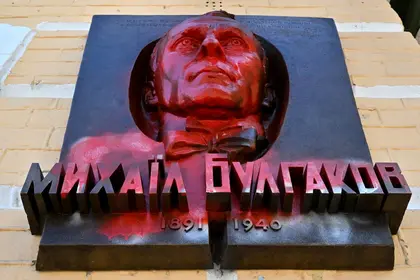A Kyiv-based institute that implements state policy on restoring and preserving the national memory of the Ukrainian people has added Soviet and Russian writer Mikhail Bulgakov to its list of people who embody “symbols of Russian imperialist policy.”
A nine-member expert committee of the Ukrainian Institute of National Memory (UINP) published its findings on April 3 after approving the conclusion on March 27.
JOIN US ON TELEGRAM
Follow our coverage of the war on the @Kyivpost_official.
Born in Kyiv to a family of Russians who were sent to the Tsarist-controlled part of Ukraine from Orlyol Gubernia, Bulgakov was described as a chauvinist who scoffed at any notion of Ukrainian statehood and was noted for disparaging remarks about Ukrainian culture and language in the report.
He was called a “deserter” for leaving the Ukrainian National Republic Army in 1919 where he served as a medic given his background as a trained surgeon.
Bulgakov, who moved to Moscow in 1921, was documented as characterizing people aspiring for Ukrainian statehood during the Russian Civil War in the wake of World War I as “despicable.” After his move, Bulgakov was the only member of his family to have not emigrated to Paris.
His most acclaimed novel was “The Master and Margarita,” published some 20 years after he died in 1940, and in the 1960s it had a profound impact (perhaps ironically now) on Western literature, music and theater. His short stories, “Heart of a Dog” and “Fatal Eggs” are also notable.

Ukraine Tells China that Russia Not Ready for 'Good Faith' Talks
However, the UINP report cites his autobiographical novel “White Guard” for mocking the Ukrainian language and its tone as “sharply expressed anti-Ukrainian orientation.”
Another autobiographical novel from his days living in Kyiv, as cited by the report, “Days of the Turbins,” expresses resentment over the fact that the landlord of the house that his family rented was owned by a Ukrainian-speaking owner who was part of the “Kyiv intelligentsia.”
Bulgakov’s literary works were exclusively written in Russian.
Throughout his works, the writer “does not present a single positive Ukrainian character... parodies or mockingly distorts the Ukrainian language, mocks the Ukrainian autocephalous church, and denies the very existence of the Ukrainian nation.”
In June, the monument to him in Kyiv near the house where he was raised in the Podil district was defaced with red paint.
Since last year and based on recently passed legislation, Kyiv has embarked on what it is calling a “decolonization” campaign. Since Russia’s all-out invasion of February 2022, Ukraine has begun dismantling monuments and changing names of street signs and subway stations linked to Russian or Soviet culture.
As a result, curators of the Bulgakov museum changed the inscription there in Russian that read, “Russian, Soviet writer,” to “prominent Kyiv resident, doctor and writer” in the Ukrainian language.
A guild called the National Union of Writers of Ukraine in 2022 called on the museum’s closure and in a statement called Bulgakov “a hater of sovereign Ukraine.”
You can also highlight the text and press Ctrl + Enter






